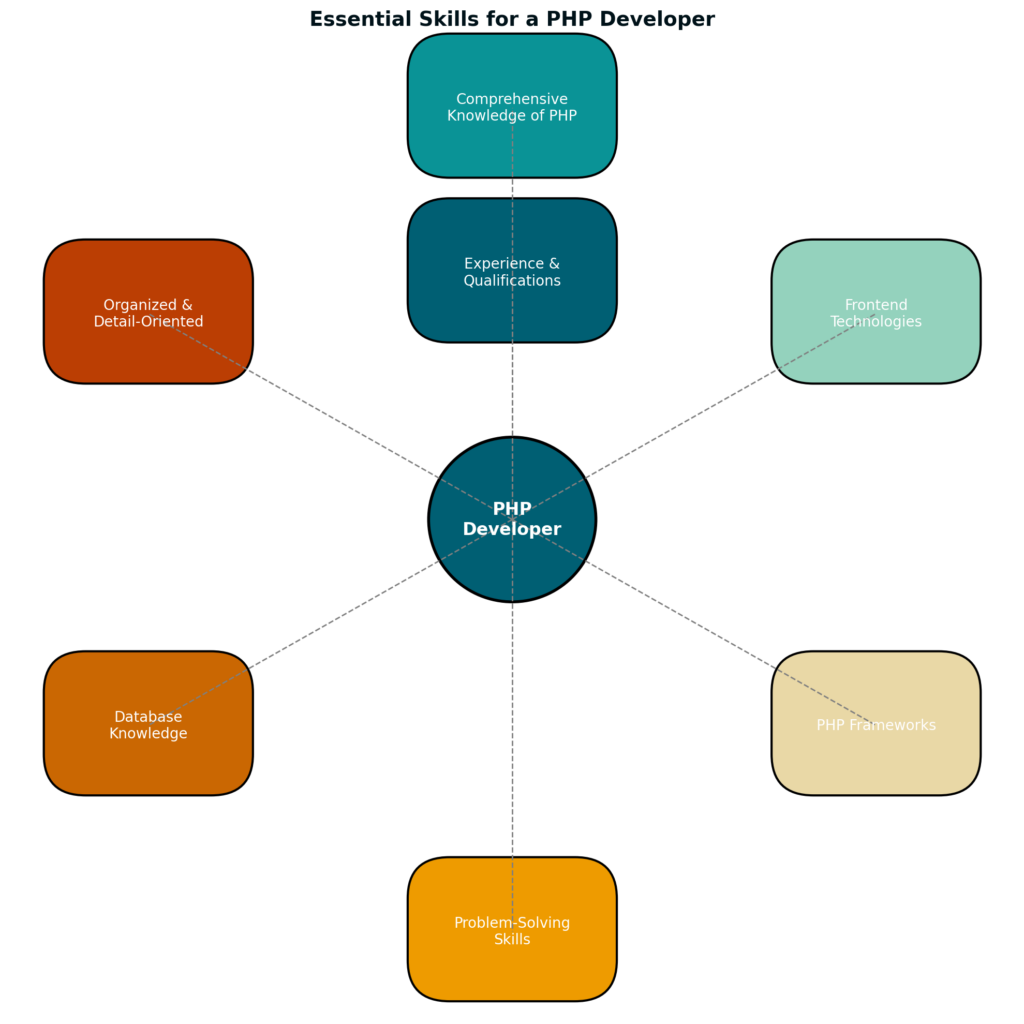To hire a PHP developer for your small business, you must first define your technical needs. These technical requirements will then inform your job description. Afterward, you will source candidates that meet your unique needs, assess them, and make a worthwhile offer.
Speaking of making a worthy offer, you might not be able to match what large tech companies can offer in terms of salary. But this shouldn’t stop you from competing for the best PHP development talents.
What you lack in monetary compensation can be balanced with attractive perks, flexible work arrangements, and opportunities for professional growth.
In this guide, you’ll learn how to hire a PHP developer and offer benefits that make you stand out.
How to Hire a PHP Developer in 7 Steps
According to a recent report, 75.4% of websites use PHP as their server-side scripting language. As such, there are equally many PHP developers — over 6 million of them, according to research. Despite this, finding the right one for your small business can be tricky.
The good news is that hiring a PHP developer involves the same process as you would for other types of developers. This includes describing your project needs, creating a compelling job description, and screening applications. Then, making an offer and onboarding the successful candidate.
The only difference is in the type of technical assessment you’d conduct to evaluate their PHP-specific skills and expertise. Follow the steps below to find a PHP developer for your small business:
1. Understanding Your Technical Needs
When clients come to me looking for a “PHP developer,” I immediately dig deeper. Are you scaling your backend team or seeking a full-stack PHP wizard? Is your stack purely PHP or mixed languages? Are you maintaining legacy code or building from scratch? These answers fundamentally change who you should hire. A startup building a new product needs a different type of developer than a company maintaining a decade-old codebase.
In addition, don’t sugarcoat your technical debt or infrastructure challenges. Being upfront about these challenges attracts the right kind of developers — those genuinely excited about solving complex problems in small team environments.
2. Craft Your “Sell Story” with Your Job Description
Once you have established the technical requirements of your project, use them to craft a compelling job description. To do this, you need to tell a story that is authentic, detailed, and includes opportunities unique to smaller organizations.
One such opportunity is technical growth. In larger companies, developers often become specialists in a narrow area of the codebase. But in a small business, they get to be technical architects of entire systems. Instead of the generic “opportunity to wear many hats,” tell a story about how the developer would shape the technical direction of your product. Say something like, “ The successful PHP developer would own the entire customer-facing API, make architectural decisions about cache implementation, and lead the transition from monolith to microservices.”
The chance to take technical ownership usually resonates well with candidates.
The impact narrative is equally crucial. In my experience, developers are often drawn to roles where they can see the direct results of their work. Small businesses have a unique advantage here. For example, you can tell developers how their code would directly affect local businesses using your platform. This tangibility of impact is something large corporations often struggle to demonstrate.
Access to decision-makers is perhaps your strongest selling point. Many experienced developers will turn down better-paying roles for a seat at the table.
When you can truthfully say, “You’ll have weekly architecture discussions with the CTO” or “Your code suggestions will be reviewed and implemented within days, not months,” you’re offering something genuinely valuable.
Finally, consider the language you use in your job description. Stick to inclusive and welcoming terms. Avoid unnecessary technical jargon that might discourage qualified candidates from applying. For example, don’t say “ rockstar developer” or “coding ninja” when “experienced PHP developer” works better.
So, with the above in mind, here is what a compelling PHP developer job description should look like:
Position: Senior PHP Developer
Location: [City] + Remote Flexibility
About Us:
[Company Name] is a growing tech company helping local businesses streamline their inventory management. Our platform serves 500+ small businesses with a real impact on their daily operations. We are looking for a senior PHP developer to join our core development team and take ownership of critical backend systems.
What You’ll Do:
• Lead the architecture and development of our core PHP-based API
• Mentor junior developers and shape our engineering culture
• Collaborate directly with our CTO on technical decisions
• Drive our transition from monolithic to microservices architecture
Required Skills:
- 5+ years PHP development experience
- Strong understanding of OOP principles
- Experience with modern PHP frameworks (Laravel/Symfony)
- SQL database design and optimization
Nice to Have:
- Experience with Redis/Memcached
- Docker containerization
- API design experience
Now you have a story that sells. The next step is putting it where your target audience can find it — where PHP developers are actively looking for opportunities.
3. Where to Actually Find Great PHP Developers
Forget traditional job boards – they’re where average talent goes to submit generic applications. The PHP developers who’ll transform your codebase actively engage in communities and build meaningful projects. Start by diving into specific PHP user groups and Slack channels like PHP Architects or Laravel.io, where developers discuss real technical challenges and share solutions. I’ve found some of my best hires by engaging in these technical discussions before even mentioning job opportunities.
GitHub searches, when done right, are gold mines for finding active PHP talent. Don’t just search for “PHP developer” – look for contributors to projects using your specific stack. If you’re using Laravel, search for developers contributing to popular Laravel packages or building similar applications.
I regularly search for developers who have implemented specific features, such as payment gateway integrations or complex API architectures, that match my client’s needs.
Personal network referrals remain the highest quality source of candidates. Tap into your existing developers’ networks – great PHP developers typically know other skilled developers. Create referral incentives and be specific about what you’re looking for. When I ask my network for referrals, I share the exact technical challenges we’re trying to solve, not just a job title.
Target developers at companies using similar technology stacks. If you’re building an e-commerce platform, look for developers at companies with similar technical challenges. Use LinkedIn to identify developers at these companies, but approach them with a genuine interest in their current work rather than an immediate job pitch.
I’ve had success engaging developers in technical discussions about their current projects before exploring potential opportunities.
This approach works because it:
- Provides specific, actionable channels
- Explains the strategy behind each method
- Offers practical implementation tips
- Maintains focus on quality over quantity
- Addresses real-world sourcing challenges
- Gives concrete examples
- Shows understanding of developer community dynamics
Another option is to solicit a specialized PHP developer recruitment agency. These agencies will help you headhunt specialized talent and handle the entire hiring process from start to finish. As a result, you can focus on your core business operations.
4. Skills to Look for a PHP Developer

A skilled PHP coder dives head-first into projects of all shapes and sizes, doing everything from whipping up code for webpages to debugging and keeping that code running smoothly. They also know their way around PHP’s latest features and the popular frameworks at the back of their hand.
An excellent PHP developer always stays one step ahead of trending technologies. They have their eyes on the future and a continuous learning mindset. A good PHP coder knows the value of clear, regular communication, and they’re just as comfortable talking to a team as they are getting lost in their code.
Here’s a fundamental rundown of skills that any top-notch PHP programmer should possess:
- Comprehensive Knowledge of PHP: They have an in-depth understanding of PHP and can efficiently use it to create web solutions. They are comfortable using the latest PHP standards (like PHP 7.x or 8) and techniques.
- Familiarity with Frontend Technologies: While specializing in PHP (a server-side language), a good PHP developer should also have a basic understanding of frontend technologies like HTML, JavaScript, and CSS to cooperate with frontend developers effectively.
- Knowledge of PHP Frameworks: They should be adept at using various PHP frameworks like Laravel, Symfony, or CodeIgniter. These tools speed up the development process and ensure more secure and reliable coding.
- Problem-Solving Skills: An effective PHP developer is skilled in identifying problems, troubleshooting issues, and finding efficient solutions.
- Knowledge of Databases: Good developers should be able to work effectively with databases, have knowledge about SQL, and understand how to work with different DBMS like MySQL, MongoDB, or PostgreSQL.
- Organized and Detail-Oriented: Good developers write clean, organized, and commented code that other developers can understand and edit if needed.
- Experience and Qualifications: Look for programmers with practical experience in PHP development and formal education. Certifications could be a plus, but they are not mandatory.
The right candidates will possess many of the above skills or be willing to learn and grow. With this out of the way, qualified candidates can move on to the next step — technical assessment.
5. The Real Technical Assessment Process
Forget theoretical tests. My assessment process focuses on real-world skills. I start by reviewing their GitHub or portfolio – actual code tells you more than any resume. Look for modern PHP practices, thoughtful documentation, and consistent commit patterns.
Follow this with a quick 15-20 minute technical chat where they walk through their most challenging project. Their explanation of technical decisions reveals more about their expertise than any algorithmic puzzle could.
For the technical assessment, I recommend a small, focused take-home project that mirrors your actual work. Instead of abstract coding challenges, give them a real problem your team has solved. For example, create a mini API endpoint with specific business logic or ask them to refactor a problematic piece of legacy code.
Set clear expectations about time investment – I usually suggest a 2-3 hour limit. This shows respect for their time while getting meaningful insight into their:
- Code organization and architecture decisions
- Error handling and edge case consideration
- Documentation practices
- Testing approach
- Git workflow
During the follow-up review, have them explain their implementation choices. Listen for their ability to:
- Justify technical decisions
- Discuss alternative approaches
- Handle constructive feedback
- Communicate technical concepts clearly
- Consider these red flags during the assessment:
- Overengineering simple solutions
- Dismissive attitude toward testing
- Copy-pasting without understanding
- Resistance to feedback
- Poor security practices
Here are more technical interview questions you can ask your PHP developer candidate:
4 Key Technical Assessment Questions to Ask Your Next PHP Hire

1. Explain the difference between == and === operator in PHP.
This question is relatively simple but helps us understand if your potential developer knows common operators in PHP and understands the concept of data types. == is an equal operator and will return TRUE if $a is equal to $b after type juggling. ===, instead, is the identical operator and will only return TRUE if $a is equal to $b and they are of the same data type.
Let’s take a look at an example:
<?php
$a = true;
$b = 1;
// Below condition returns true and prints "a and b are equal"
if ($a == $b) {
echo "a and b are equal";
} else {
echo "a and b are not equal";
}
// Below condition returns false and prints "a and b are not equal"
// because $a and $b are of different data types.
if ($a === $b) {
echo "a and b are equal";
} else {
echo "a and b are not equal";
}
?>
2. Explain what a session is in PHP and how to remove data from a session.
Essentially, PHP sessions are used to directly store data for individual users and clients against a unique session ID to maintain states on the server and share data across multiple pages. The session IDs are typically “sent to the browser via session cookies and the ID is used to retrieve existing session data.” If, however, a session ID is not present on the server already, PHP creates a new session and generates a unique session ID.
Let’s look at an example:
<?php
// Starting a session
session_start();
// Creating a session
$_SESSION['user_info'] = [
'user_id' => 1,
'first_name' => 'php',
'last_name' => 'scots',
'status' => 'active'
];
// Checking session
if (isset($_SESSION['user_info'])) {
echo "Logged In";
}
// Unsetting (removing) a value from the session
unset($_SESSION['user_info']['first_name']);
// Destroying the complete session
session_destroy();
?>
3. Show how to register a variable in a PHP session.
There are two ways to register a variable in a PHP session that your PHP developer to hire should know. In PHP 5.3 or below, it should be registered via the session_register() function. Now, however, it’s possible to directly set a value in $_SESSION Global.
Here’s an example of both:
<?php
// Starting session
session_start();
// Use of session_register() is deprecated
$username = "PhpScots";
// session_register("username"); // This line is commented out because session_register() is deprecated
// Use of $_SESSION is preferred
$_SESSION["username"] = "PhpScots";
?>
4. In PHP, what are constructors and destructors?
Constructor and Destructor – although it sounds like the relatives of Optimus Prime or Megatron – it’s quite (a lot different).
They are special type functions called when a PHP class object is created and destroyed.
Constructors are typically used to initialize the private variables, while destructors free up the resources created and used by the class.
Here is a sample:
<?php
class Foo {
private $name;
private $link;
public function __construct($name) {
$this->name = $name;
}
public function setLink(Foo $link) {
$this->link = $link;
}
public function __destruct() {
echo 'Destroying: ', $this->name, PHP_EOL;
}
}
?>
6. Structure a competitive offer package that leverages small business advantages
The best candidates won’t wait around too long. So, if you have found one, act fast and propose a worthy offer.
To do so, don’t try to match corporate-style compensation packages. Recognize your position as a small business and make an offer highlighting your unique benefits — for instance, immediate technical ownership or profit sharing.
The compensation structure needs careful thought. Rather than just offering a standard salary, consider creating a base-plus-impact model. For instance, base salary plus performance bonuses tied to successful project deliveries or measurable improvements in system performance.
Also, you need to structure equity tied to specific technical milestones that directly impact business growth. This ensures alignment between developer and company success while providing a path to significant financial upside.
In terms of benefits, focus on offering flexibility and growth opportunities that larger companies can’t match. Consider including:
- Flexible work hours and remote options
- Direct mentorship from technical leaders or founders
- Opportunity to influence technical direction and architecture
- Professional development budget for courses and conferences
- Clear path to technical leadership roles
- Involvement in business strategy discussions
- Freedom to experiment with new technologies
Pro Tip: Personalize the offer letter. Beyond stating the salary and benefits, include specific technical projects they’ll own and their potential impact on the company’s growth. This personal touch shows you value their unique skills and have a clear vision for their role.
7. Create a Lean But Thorough Technical Onboarding System
The key to small business onboarding is structure without bureaucracy. Start with a technical welcome package sent before day one. This can be a document that includes your git workflow, coding standards, database schemas, and architecture diagrams. This way, your PHP developer can familiarize themself with your setup ahead of time — saving days of basic questions and orientation.
Create a first-week technical roadmap. To do this, break down the first week into specific technical milestones. Here’s what it can entail: Day one: Set up a local development environment and make a small code change. Day two: Walk through the database structure and API endpoints. Day three: Handle a small customer-facing bug. Each task built confidence while providing practical system knowledge. You get the idea.
Another thing to provide is documentation. Create living documentation that evolves with your codebase. Instead of lengthy manuals, maintain:
- A README.md with clear setup instructions and common troubleshooting steps
- Inline code comments explaining complex business logic
- API documentation using tools like Swagger
- Architecture decision records (ADRs) explaining key technical choices
- A centralized knowledge base for recurring issues and solutions
Assign a technical buddy but with clear boundaries. This means having a designated team member who can answer questions and provide guidance. But structure check-in times to avoid constant interruptions. This balance helps both the new hire and existing team members maintain productivity.
Don’t forget security and access management. Create a clear checklist of required accesses, but space them out logically. I’ve seen too many small businesses either give too much access too quickly or create bottlenecks by not providing enough. Design an access timeline that aligns with your learning curve.
Remember to measure onboarding success. Create simple metrics like “time to first production deploy” or “days to first independent bug fix.” Use them to continuously improve and refine your onboarding process for future hires.
Over to you
So, there you have it: how to hire a PHP developer. Follow these steps, and you are one step closer to hiring someone perfect for your project.
While all this is true, executing it is not so straightforward, especially for a first-timer. From describing your project’s technical requirements to creating a job description and sourcing for candidates — it is time-consuming and requires significant expertise to get it right. And in most cases, any mistake can set you back for a long time.
If you prefer not to take chances and nail down your recruitment on the first try, talk to us at DistantJob. With over ten years of experience in headhunting the best IT talent, you can rest assured that you will find the perfect fit for your company in just a few weeks. We also take care of all the payroll – making the entire process of hiring a PHP Developer much easier for you.
Hire the right PHP developer for your company now with DistantJob!
FAQ
The avergae hourly rate for a PHP developer in the US can range anywhere from $30 to $150, with the median being around $75 per hour, while in Latin america, due to lower cost of living, can range from around $15 to $50, with many experienced developers falling into the $20-$40 range.
There are plentiful developers with PHP skills. However, finding a highly skilled, experienced PHP developer, or one who is adept in a specific framework or type of project may pose more of a challenge. These developers are in high demand and can be snapped up quickly. It’s also crucial to remember that finding a developer is one thing, but finding one who fits your company culture and works well with your existing team is another task altogether.
Job boards and freelance platforms, exploring developer communities like GitHub, engaging with a specialist recruitment agency such as DistantJob can be a good place to find PHP programmers.





